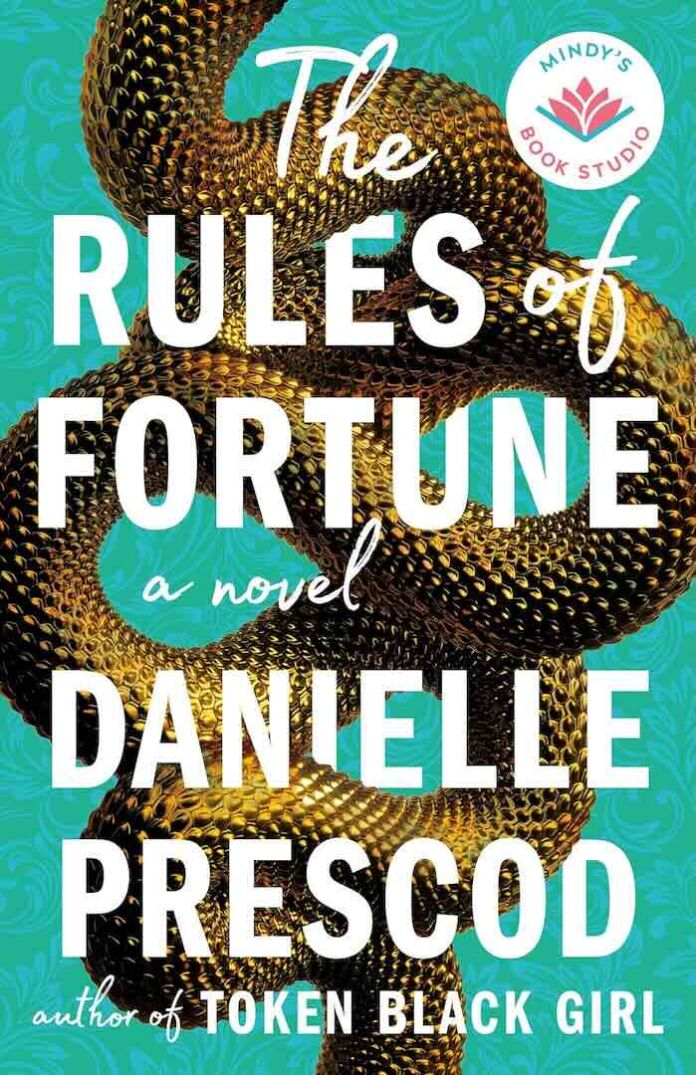The Rules of Fortune arrives as Prescod’s follow-up to her acclaimed memoir Token Black Girl, and it’s evident that she has successfully transitioned from personal narrative to fiction while maintaining her sharp insights into race, class, and privilege. This gripping tale of the Carter family – Black billionaires preparing for their patriarch’s seventieth birthday celebration – quickly transforms into a penetrating examination of how fortunes are built and the secrets that sustain them.
Plot & Narrative Structure
The novel opens at Watcha Cove, the Carters’ Martha’s Vineyard estate, where the sudden death of William Carter Jr. sets off a chain of revelations that threaten to unravel the family’s carefully constructed facade. Through alternating perspectives and timelines, Prescod weaves together the past and present, gradually exposing the foundations of the Carter Corporation and the moral compromises that enabled its success.
The narrative particularly shines in its exploration of Kennedy Carter, the youngest child who serves as both protagonist and moral compass. Her journey from creating a birthday tribute video to uncovering devastating family secrets drives the plot while raising profound questions about responsibility, inheritance, and the true cost of wealth.
Character Development & Dynamics
Prescod excels in creating complex, flawed characters who defy easy categorization:
- William Carter Jr. – A self-made billionaire whose pursuit of wealth masks deep-seated insecurities and ruthless ambition
- Jacqueline Bennett Carter – A former actress whose carefully maintained image conceals her own compromises and sacrifices
- Kennedy Carter – The idealistic daughter whose search for truth threatens everything her family has built
- Asher Bennett Carter – The heir apparent whose identity crisis reveals deeper family secrets
- Tashia Carter – Kennedy’s best friend who becomes unwittingly entangled in the family’s web of deception
Themes & Social Commentary
The novel masterfully explores several interconnected themes:
- Wealth and Power: Prescod demonstrates how the accumulation and maintenance of extreme wealth often requires moral compromise, showing through the Carter Corporation’s activities in Ghana how capitalism can perpetuate exploitation across racial lines.
- Legacy and Identity: The question of what we inherit—both materially and morally—runs throughout the narrative, particularly through Kennedy’s struggle with her family’s legacy and Asher’s discovery of his true parentage.
- Truth and Deception: The novel expertly examines how families maintain their myths and the price of keeping secrets, showing how truth can be both weapon and salvation.
Writing Style & Technical Execution
Prescod’s prose is sharp and efficient, moving seamlessly between different time periods and perspectives while maintaining narrative tension. Her background in journalism shows in her attention to detail and ability to craft realistic dialogue across different social classes and contexts.
Critical Analysis
While the novel succeeds on many levels, there are moments where the pacing feels uneven, particularly in the middle section where some plot threads seem to lose momentum before picking up again for the finale. Additionally, some readers might find the resolution slightly too neat given the complexity of the moral questions raised.
Strengths:
- Compelling exploration of wealth, power, and family dynamics
- Well-developed characters with complex motivations
- Strong sense of place and social context
- Nuanced handling of race and class
- Engaging mystery elements
Areas for Improvement:
- Some subplots could be more fully developed
- Pacing occasionally uneven
- Certain character arcs resolved too quickly
- Some thematic elements could be explored more deeply
Comparative Context
The Rules of Fortune sits comfortably alongside other contemporary novels examining wealth and family dynamics, such as Succession by Jesse Armstrong and The Nest by Cynthia D’Aprix Sweeney. However, Prescod’s perspective as a Black woman writing about Black wealth adds unique depth to the narrative.
Final Verdict
The Rules of Fortune is an ambitious and largely successful sophomore effort from Prescod. Despite some minor pacing issues, the novel delivers a compelling story that asks important questions about the nature of wealth, family, and moral responsibility. It’s particularly relevant in our current moment of examining systemic inequality and generational wealth.
Recommendation
This book is highly recommended for readers who enjoy:
- Family dramas with complex moral questions
- Stories about wealth and power
- Mysteries involving family secrets
- Social commentary on race and class
- Character-driven narratives
Target Audience
The Rules of Fortune will appeal to readers of literary fiction who appreciate nuanced explorations of family dynamics, as well as those interested in contemporary discussions about wealth, race, and power in America. It’s particularly relevant for readers who enjoyed Prescod’s previous work and those who follow similar authors examining these themes.
Impact & Relevance
In an era of increasing wealth inequality and racial reckoning, The Rules of Fortune offers a timely examination of how power operates across racial and class lines. Prescod’s novel contributes meaningfully to ongoing discussions about privilege, responsibility, and the true cost of success in America.
The book serves as both an entertaining family drama and a thought-provoking commentary on the moral compromises required to build and maintain extreme wealth. It challenges readers to consider their own relationship with money, power, and family loyalty.





